New Stuff[hide]
Musicos: Rafael Paseiro Monzón
Musicos: Dennis Nicles Cobas
Musicos: Jiovanni Cofiño Sánchez
Musicos: Yasser Morejón Pino
Fotos: Tom Ehrlich : 2024 Monterey Jazz, P...
Resenas: Vacilón Santiaguero (Circle 9 ...
Staff: Bill Tilford
Fotos: Tom Ehrlich : 2024 Monterey Jazz, P...
Fotos: Tom Ehrlich : 2024 Monterey Jazz Fe...
Fotos: Tom Ehrlich : testing 123
Grupos: Pupy y los que S... : Discography - 1995- F...
Reportes: From The St... : Cubadisco 2...
Reportes: From The St... : Jazz Plaza ...
Fotos: Tom Ehrlich : Irakere 50th Annivers...
Photos of the Day [hide]
Peter Maiden - Cuba and California: Prospects for Change and Opportunity
"Cuba and California: Prospects for Change and Opportunity" met at the Banatao Auditorium in Sutardja Dai Hall at the University of California, Berkeley on Friday, September 28, 2012
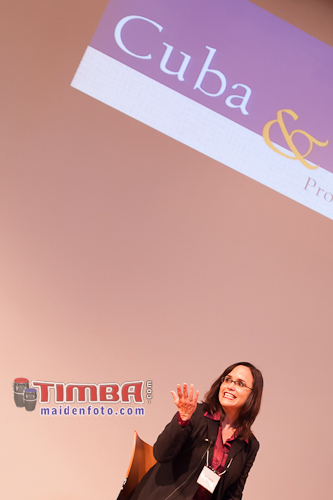
Lisa García Bedolla, the Chair of the Center for Latino Policy Research at UC Berkeley, was a facilitator. She is of Cuban descent and comes from Los Angeles.
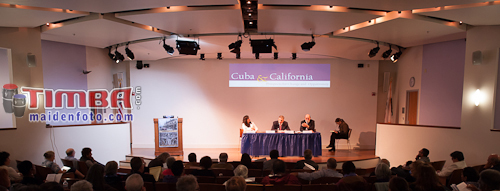
From left to right: Cristina Mora, of UC Berkeley, Arturo López-Levy, of the University of Denver, Wayne Smith, of the Center for International Policy, and Katherine Gordy, of San Francisco State.
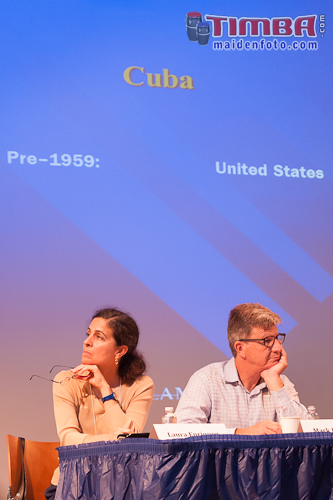
Laura Enríquez, of UC Berkeley, and Mark Entwhistle, of the Canadian Defense and Foreign Affairs Institute.
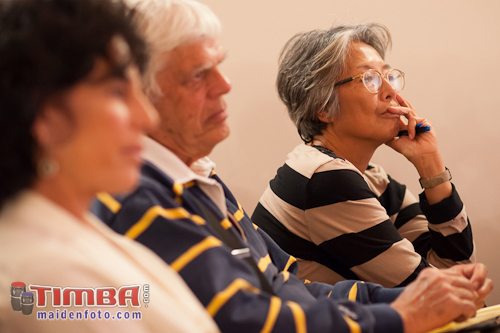
Listening from the audience.
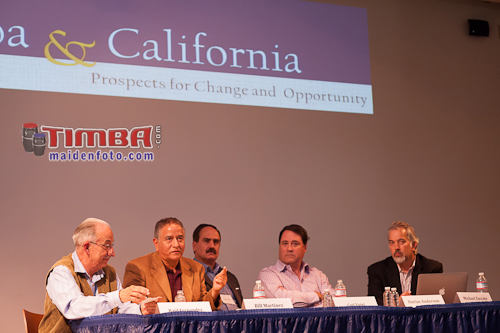
Left to right: Raúl Fernandez, UC Irvine, Bill Martinez, San Francisco Attorney, Carl Voight, USC Marshall School of Business, Darius Anderson, Platinum Advisors, Michael Zuccato, President, Cuba Travel Services.
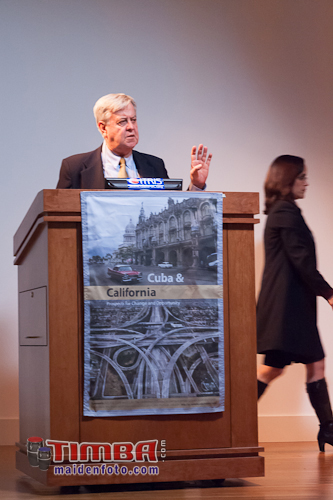
Carlos Alzugaray Treto, Center for Hemispheric and United States Studies, University of Havana. Lisa García Bedolla is passing behind him.
“Cuba and California: Prospects for Change and Opportunity,” was a conference hosted jointly by the UC Berkeley Institute for Governmental Studies, Institute for the Study of Societal Issues, Center for Latino Policy Research and Center for Latin American Studies. The daylong discussion was held September 28 in the sparkling Banatao Auditorium on the Berkeley campus.
Opened up by local Congresswoman Barbara Lee and closed by keynote speaker Professor Carlos Alzugaray Treto of the Center for Hemispheric and United States Studies at the University of Havana, the conversation focused on the Cuban economy, developments within Cuba since Fidel Castro stepped down six years ago, and the slight progress in U.S.-Cuban relations during the Obama presidency.
In some ways, not so much has changed since I was a student at the Center for Latin American Studies in the 1980s. At that time I heard Wayne Smith, who was an American diplomat in Cuba under President Carter, speak about the self-defeating nature of the embargo against Cuba, and he was present once again at this conference saying, well, the same thing. It used to be, however, that Cuba was a player in the Cold War, and that is over. The U.S. can no longer claim that Cuba is fomenting Soviet schemes in the Americas.
I learned from multiple presenters that since Cuba has established trade with many countries, the Cuban economy—while struggling—has recovered from the slump it went through in the aftermath of the fall of the Soviet Union, and is weathering the American embargo. It was also shown by scholars that the generation of leaders emerging to take the place of the aging revolutionaries is more representative of the gender and ethnicity of the Cuban population.
The late afternoon panel featured Bill Martinez, the San Francisco attorney—and friend of Timba.com—who works tirelessly helping musicians from Cuba get visas to come to the U.S. With him was Michael Zuccato, President of Cuba Travel Services, who is making an effort along with Congresswoman Lee and others to initiate direct flights from Oakland to Cuba. Darius Anderson of Platinum Advisors, who is an advocate of a number of ventures to link California to Cuba, was also on the panel, and he was a major donor towards making the conference possible.
What struck me most about the program was the care all of the presenters showed for Cuba’s present and future. There were differences of background, focus and opinion, but the element of cynicism that has been so prevalent in Washington was largely absent. The expressed hope of both Americans and Cubans at the conference was for free exchange between our two countries, and between the folks of the far-flung Cuban Diaspora.
Professor Alzugaray Treto, who is a specialist in the study of the embargo and all its concomitant frustrations, finished his speech at the end of the day with the suggestion of a new attitude for Cubans: “I don’t care if you lift the embargo or not, because I am doing very well!” If nothing else works, he said, perhaps this will.



















